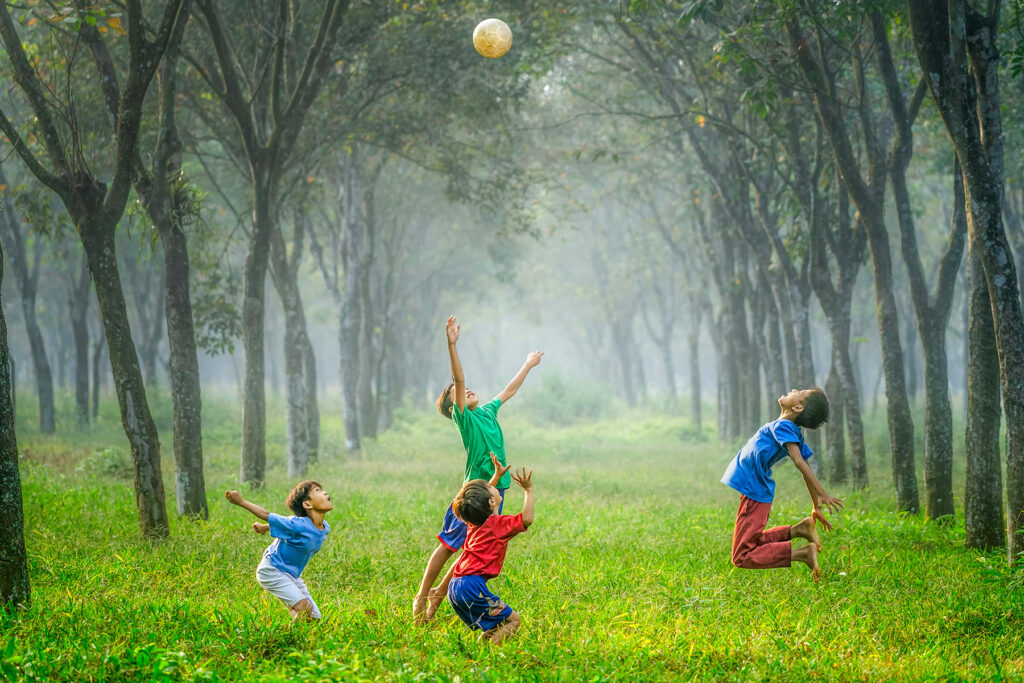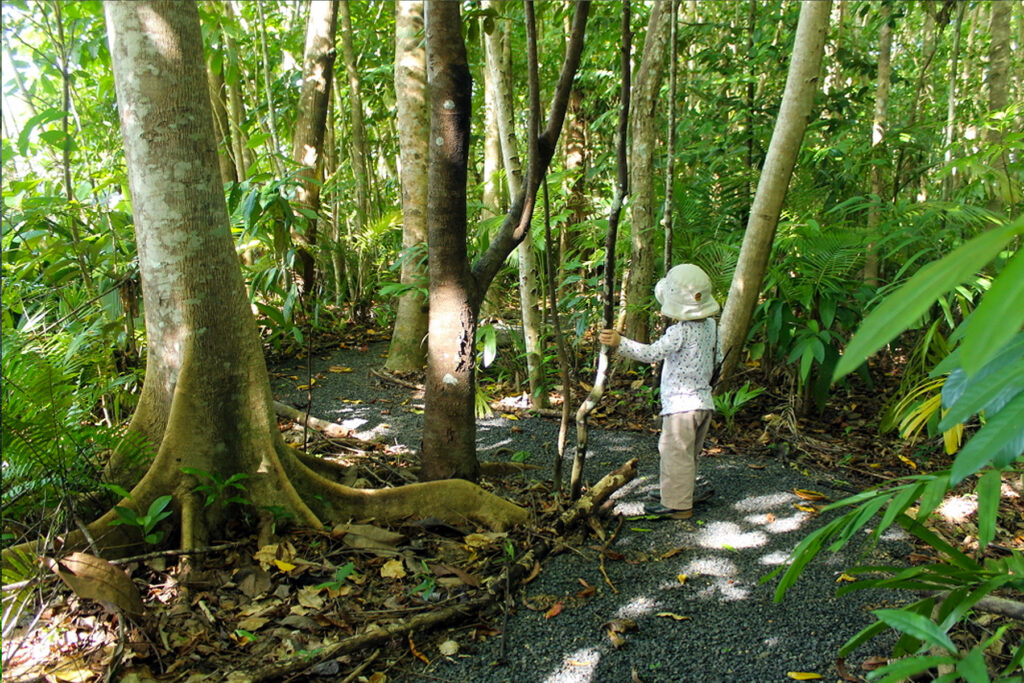Information & resources to enable and encourage kids into the outdoors and outdoor activities.
Advice for Young People Dreaming of Adventure
Alastair Humphreys
Organisations
We’re here for Queensland children, young people and families
We help keep Queensland children safe by assisting organisations to be child-safe and screening people who work with children.
The National Principles for Child Safe Organisations set out a nationally consistent approach to promoting a culture of child safety and wellbeing within organisations. The principles give effect to the child safe standards that were recommended by the Royal Commission and bring attention to general child safety and wellbeing issues.
Nature Play QLD‘s mission is to increase the time Queensland kids spend in unstructured play outdoors and in nature. It is founded on the understanding that unstructured play outdoors – nature play – is fundamental to a full and healthy childhood.
Nature play promotes health benefits, including cognitive, social and emotional development, and it builds resilience and creativity as well. Experiences in nature as a child also leads to environmental awareness and stewardship later in life.
Nature Play QLD is a collaborative organisation, working with partner groups to encourage the Queensland community to value nature play, and support families to prioritise it in children’s lives. Our primary role is to advocate the nature play message and to increase access to nature play resources, events and programs for Queenslanders.
Nature Play QLD is inspired by the ideas of American social commentator Richard Louv and the Children & Nature Network.
Articles
Affordable Alternatives to Screen Time That Keep Kids Happy and Engaged
Raising children has never been easy, but issues like limiting screen time are ones that our own parents never had to consider. While this worry may be new, research already shows how limiting screen time is beneficial for children, especially when it comes to cognitive development. If you’re worried about how to find alternatives – and how to keep the costs of those activities from busting your budget – look no further! Read More
An article by Ngaire Trigg who was inspired to “learn as much as I can so that my own children can learn, respect and be inspired by the wonderful enriching culture right here in our own backyard” after attending the Outdoors Queensland Symposium 2018 in Cairns.
Why kids need risk, fear and excitement in play
Risky play is thrilling and exciting play where children test their boundaries and flirt with uncertainty. They climb trees, build forts, roam the neighbourhood with friends or play capture the flag. Research shows such play is associated with increased physical activity, social skills, risk management skills, resilience and self-confidence. These findings make intuitive sense when you watch children at play.
Learning from Trees
Life Lessons for Future Generations
This report explores the skills and attributes children need in order to help them deal with future challenges. It combines Australian and international peer-reviewed academic research with the results of a snapshot survey of 200 teachers. The survey was designed and commissioned by Planet Ark and conducted online by consultants Kimberlin Education in April 2017.
Sport Not Enough
Organized sports not enough to fulfill activity requirements. Organized sports don’t provide children with nearly as much exercise as many parents might expect, according to a Kansas State University study.
From books, arts and sports classes to iPads and television, many parents do everything in their power to entertain and educate their children. But what would happen if children were just left to be bored from time to time? How would it affect their development?
At TED U, Gever Tulley, founder of the Tinkering School, spells out the 5 dangerous things you should let your kids do — and why a little danger is good for both kids and grownups.
Part transcript
“Five Dangerous Things.”
Thing number one: Play with fire. Learning to control one of the most elemental forces in nature is a pivotal moment in any child’s personal history. Whether we remember it or not, it’s the first time we really get control of one of these mysterious things. These mysteries are only revealed to those who get the opportunity to play with it. So, playing with fire. This is like one of the great things we ever discovered, fire. From playing with it, they learn some basic principles about fire, about intake, combustion, exhaust. These are the three working elements of fire that you have to have for a good, controlled fire. And you can think of the open-pit fire as a laboratory. You don’t know what they’re going to learn from playing with it. Let them fool around with it on their own terms and trust me, they’re going to learn things that you can’t get out of playing with Dora the Explorer toys.
Number two: Own a pocketknife. Pocketknives are kind of drifting out of our cultural consciousness, which I think is a terrible thing.
Your first pocketknife is like the first universal tool that you’re given. You know, it’s a spatula, it’s a pry bar, it’s a screwdriver and it’s a blade, yeah. And it’s a powerful and empowering tool. And in a lot of cultures they give knives — like, as soon as they’re toddlers, they have knives. These are Inuit children cutting whale blubber. I first saw this in a Canadian Film Board film when I was 10, and it left a lasting impression, to see babies playing with knives. And it shows that kids can develop an extended sense of self through a tool at a very young age. You lay down a couple of very simple rules — always cut away from your body, keep the blade sharp, never force it — and these are things kids can understand and practice with. And yeah, they’re going to cut themselves. I have some terrible scars on my legs from where I stabbed myself. But you know, they’re young. They heal fast.
Number three: Throw a spear. It turns out that our brains are actually wired for throwing things, and like muscles, if you don’t use parts of your brain, they tend to atrophy over time. But when you exercise them, any given muscle adds strength to the whole system, and that applies to your brain, too. So practicing throwing things has been shown to stimulate the frontal and parietal lobes, which have to do with visual acuity, 3D understanding, and structural problem solving, so it helps develop their visualization skills and their predictive ability. And throwing is a combination of analytical and physical skill, so it’s very good for that kind of whole-body training. These kinds of target-based practices also help kids develop attention and concentration skills, so those are great.
Number four: Deconstruct appliances. There is a world of interesting things inside your dishwasher. Next time you’re about to throw out an appliance, don’t throw it out. Take it apart with your kid, or send him to my school, and we’ll take it apart with them. Even if you don’t know what the parts are, puzzling out what they might be for is a really good practice for the kids to get sort of the sense that they can take things apart, and no matter how complex they are, they can understand parts of them. And that means that eventually, they can understand all of them. It’s a sense of knowability, that something is knowable. So these black boxes that we live with and take for granted are actually complex things made by other people, and you can understand them.
Number five: Two-parter. 1. Break the Digital Millennium Copyright Act.
There are laws beyond safety regulations that attempt to limit how we can interact with the things that we own — in this case, digital media. It’s a very simple exercise: Buy a song on iTunes, write it to a CD, then rip the CD to an MP3, and play it on your very same computer. You’ve just broken a law. Technically, the RIAA could come and prosecute you. It’s an important lesson for kids to understand, that some of these laws get broken by accident, and that laws have to be interpreted. That’s something we often talk about with the kids when we’re fooling around with things and breaking them open, and taking them apart and using them for other things. And also when we go out and drive a car.
2. Driving a car is a really empowering act for a young child, so this is the alternate —
For those of you who aren’t comfortable actually breaking the law, you can drive a car with your child. This is a great stage for a kid. This happens about the same time that they get latched onto things like dinosaurs, these big things in the outside world, that they’re trying to get a grip on. A car is a similar object, and they can get in a car and drive it. And that really gives them a handle on a world in a way that they don’t often have access to. And it’s perfectly legal. Find a big empty lot, make sure there’s nothing in it, and that it’s on private property, and let them drive your car. It’s very safe actually. And it’s fun for the whole family.
The revolution will not take place in the classroom
On the Wildness of Children
by Carol Black / April 2016
“In Wildness is the preservation of the World.” Thoreau says it in “Walking,” and Jack Turner, in his exquisite collection of essays, The Abstract Wild, questions how many of us have any idea what it means. People often misread the quote, Turner points out, as “In wilderness is the preservation of the world;” but Thoreau did not say that preserving wilderness preserves the world; he said that wildness preserves.
Source
Professor Dame Sally Davies
Chief Medical Officer for England
www.twitter.com/CMO_England
Huffington Pos
Recommend a Resource
Have an interesting or useful resource or link to share?
Let us know by Recommending a Resource










